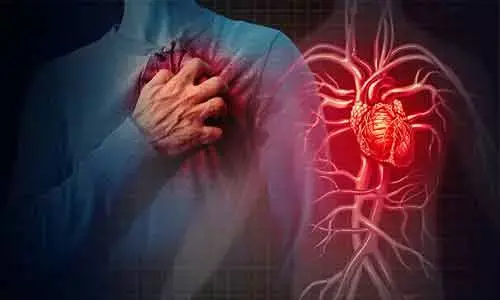- Home
- Medical news & Guidelines
- Anesthesiology
- Cardiology and CTVS
- Critical Care
- Dentistry
- Dermatology
- Diabetes and Endocrinology
- ENT
- Gastroenterology
- Medicine
- Nephrology
- Neurology
- Obstretics-Gynaecology
- Oncology
- Ophthalmology
- Orthopaedics
- Pediatrics-Neonatology
- Psychiatry
- Pulmonology
- Radiology
- Surgery
- Urology
- Laboratory Medicine
- Diet
- Nursing
- Paramedical
- Physiotherapy
- Health news
- Fact Check
- Bone Health Fact Check
- Brain Health Fact Check
- Cancer Related Fact Check
- Child Care Fact Check
- Dental and oral health fact check
- Diabetes and metabolic health fact check
- Diet and Nutrition Fact Check
- Eye and ENT Care Fact Check
- Fitness fact check
- Gut health fact check
- Heart health fact check
- Kidney health fact check
- Medical education fact check
- Men's health fact check
- Respiratory fact check
- Skin and hair care fact check
- Vaccine and Immunization fact check
- Women's health fact check
- AYUSH
- State News
- Andaman and Nicobar Islands
- Andhra Pradesh
- Arunachal Pradesh
- Assam
- Bihar
- Chandigarh
- Chattisgarh
- Dadra and Nagar Haveli
- Daman and Diu
- Delhi
- Goa
- Gujarat
- Haryana
- Himachal Pradesh
- Jammu & Kashmir
- Jharkhand
- Karnataka
- Kerala
- Ladakh
- Lakshadweep
- Madhya Pradesh
- Maharashtra
- Manipur
- Meghalaya
- Mizoram
- Nagaland
- Odisha
- Puducherry
- Punjab
- Rajasthan
- Sikkim
- Tamil Nadu
- Telangana
- Tripura
- Uttar Pradesh
- Uttrakhand
- West Bengal
- Medical Education
- Industry
Galectin-3 can predict CVD risk in diabetes patients: ESC 2020

Spain: Plasma levels of galectin-3 can help in the prediction of cardiovascular events in patients with type 2 diabetes (T2D) suggests a recent study presented at the European Society of Cardiology (ESC) Congress 2020. The study found that In coronary artery disease (CAD) patients, cardiovascular events are predicted by plasma levels of galectin-3 in patients with T2D, and by MCP-1 and NT-proBNP in those without T2D.
Type 2 diabetes can lead to early and severe atherosclerosis. However, only a few biomarkers can predict cardiovascular events in this group of patients. A Lorenzo-Almoros, Fundacion Jimenez Diaz University Hospital, Internal Medicine - Madrid - Spain, and colleagues followed 964 patients with coronary artery disease. They assessed baseline galectin-3, monocyte chemoattractant protein-1 (MCP-1) and N-terminal fragment of brain natriuretic peptide (NT-proBNP) plasma levels in them. The primary was the combination of the secondary outcomes. Secondary outcomes were acute ischemia and heart failure or death.
The percentage of male patients were 75 in T2D and 76.6 in the non-T2D group. Age was 61.0 and 60.0 years, respectively. 232 patients had T2DM. The patients were followed up for a median of 5.39 years.
Key findings of the study include:
- Patients with T2DM showed higher MCP-1 [144 vs. 133 pg/ml] and galectin-3 [8.3 vs. 7.8 ng/ml] levels.
- Galectin-3 levels were associated with increased risk of the primary outcome in T2D patients [HR 1.57], along with a history of cerebrovascular events.
- Treatment with clopidogrel was associated with lower risk.
- NT-proBNP and MCP-1, but not galectin-3, were related to increased risk of the event in non-diabetic patients [HR 1.21 and HR 1.23 respectively], along with male sex and age.
- Galectin-3 was also the only biomarker that predicted the development of acute ischemic events and heart failure or death in T2D patients, while in non-diabetics MCP-1 and NT-proBNP, respectively, predicted these events.
"In CAD patients, cardiovascular events are predicted by galectin-3 plasma levels in patients with T2DM, and by MCP-1 and NT-proBNP in those without T2DM," concluded the authors.
"Galectin-3 predicts cardiovascular events in patients with type-2 diabetes," was presented at the ESC Congress 2020.
Dr Kamal Kant Kohli-MBBS, DTCD- a chest specialist with more than 30 years of practice and a flair for writing clinical articles, Dr Kamal Kant Kohli joined Medical Dialogues as a Chief Editor of Medical News. Besides writing articles, as an editor, he proofreads and verifies all the medical content published on Medical Dialogues including those coming from journals, studies,medical conferences,guidelines etc. Email: drkohli@medicaldialogues.in. Contact no. 011-43720751


